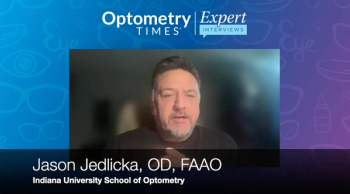
Paul Hahn, MD, PhD, shares insights on pegcetacoplan versus avacincaptad pegol in patients with geographic atrophy
Paul Hahn, MD, PhD, shared insights on research comparing the relative efficacy of pegcetacoplan versus avacincaptad pegol in patients with geographic atrophy presented at the 2023 ASRS annual meeting.
Paul Hahn, MD, PhD, shared insights on research comparing the relative efficacy of pegcetacoplan versus avacincaptad pegol in patients with geographic atrophy presented at the 2023 ASRS annual meeting.
Video Transcript
Editor's note - This transcript has been edited for clarity.
Paul Hahn, MD, PhD:
My name is Paul Hahn. I'm a
We went from having no treatments for
A better way to do it is an analytical method called the anchored matched-adjusted indirect comparison. In this approach, called the MAIC, you try to match and balance the patient populations between the 2 different groups. So, you apply the inclusion and exclusion criteria from 1 trial to the other trial. Then you match or balance the populations by propensity score weighting to try to get as similar of a population between each group as possible.
So in this trial, or in this study, patients from the pegcetacoplan studies, OAKS and DERBY, were filtered out to identify the same inclusion, exclusion criteria as from the avacincaptad pegol trial, called GATHER 2, only including patients that had non-subfoveal atrophy excluding patients with fellow eye, CNV, et cetera, and then balancing key characteristics like vision, lesion size, multifocal, et cetera. In the end, we found that when we compared pegcetacoplan monthly to avacincaptad pegol monthly, we found a statistically significant greater reduction with pegcetacoplan compared to avacincaptad pegol in OAKS, not in DERBY. But in a combined analysis, we also found a statistically significant greater reduction by 30% of pegcetacoplan monthly compared to avacincaptad pegol monthly when we compared pegcetacoplan every other month, in other words, less frequent dosing.
Compared to avacincaptad pegol monthly, we found that although all the trends favored pegcetacoplan every other month, there was no statistical difference suggesting comparable efficacy. So, the overall conclusion of our study was that pegcetacoplan monthly appeared to show a better efficacy profile than avacincaptad pegol monthly in non-subfoveal GA patients. Every other month, or less frequent, dosing with pegcetacoplan appeared to show comparable efficacy profile to avacincaptad pegol.
Newsletter
Want more insights like this? Subscribe to Optometry Times and get clinical pearls and practice tips delivered straight to your inbox.















































